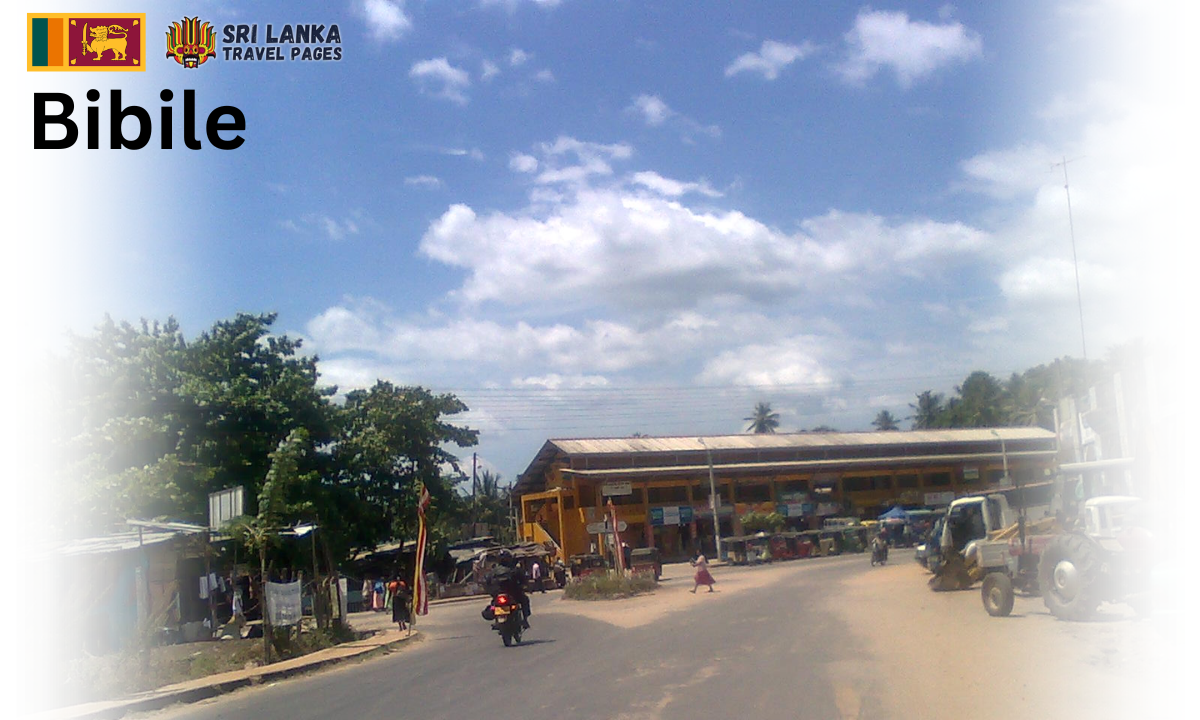
位于斯里兰卡乌沃省莫纳拉嘎拉区, 圣经 比比尔是一座迷人的乡村小镇,以其葱郁的绿植、连绵起伏的山丘和宁静的环境而闻名。远离城市喧嚣,比比尔为您提供一处静谧的世外桃源,让您沉浸在自然和传统的斯里兰卡乡村生活中。该镇以其肥沃的农田而闻名,盛产香蕉、木瓜和其他热带水果。比比尔也拥有丰富的草药和阿育吠陀传统,许多当地人仍然依赖世代相传的自然疗法。
作为通往 马杜鲁大屋国家公园比比勒吸引着生态游客和探险爱好者,他们渴望探索原始荒野。通往比比勒的路线风景如画,是自然摄影和徒步旅行的理想之地。
比比尔 (Bibile) 的文化活力体现在其乡村寺庙、当地集市以及展现当地文化遗产的年度节庆中。无论您是寻求独处体验的旅行者、自然爱好者,还是对斯里兰卡农业和阿育吠陀感兴趣的人,比比尔都是一块值得探索的隐秘瑰宝。
对于那些计划在斯里兰卡进行一次非同寻常的旅行的人来说,Bibile 承诺提供真实、温暖和自然美景,以及宁静的高地魅力。
总人口
40,329
GN 部门
40
🌿 为什么 Bibile – 斯里兰卡如此特别?
药草之乡、高地宁静与乡村灵魂
坐落于斯里兰卡乌瓦省中心地带, 圣经 比比勒(Bibile)是莫纳拉嘎拉地区一处宁静而强大的存在,以其传统的草药知识、风景秀丽的山谷和根深蒂固的生活方式而闻名。远离喧嚣的旅游路线,比比勒是健康、和谐与文化遗产的圣地。
🌱 古老的治疗传统
圣经因其对土著文化的贡献而受到斯里兰卡的广泛赞誉 阿育吠陀医学该地区拥有数百年历史的疗愈实践,以代代相传的天然草药和疗法为特色。当地医生被称为 吠陀经—仍然使用生长在比比尔肥沃高地的植物来提供治疗。
🏞️ 山丘、河流和郁郁葱葱的山谷
比比尔周围环绕着缓坡,点缀着香蕉种植园,景色令人心旷神怡,令人心旷神怡。 戈纳加纳拉河 溪水流淌在附近,滋润着农田,也为乡村生活提供了宁静的背景。热爱自然的人们一定会喜欢这里未受破坏的地形和风景优美的路线,这里是慢旅行的理想之地。
👨🌾 农业中心地带
农业是比比莱(Bibile)的命脉。从甜香蕉到时令蔬菜,该镇的农产品供应周边地区。农民依靠传统方法,将古老的知识与尊重自然规律的可持续实践相结合。
🍛 本地风味,本土温暖
在 Bibile 的家里和路边小吃店,可以吃到丰盛的米饭, 杰克水果咖喱以及用野菜调味的绿叶蔬菜。菜肴营养丰富,充满田园气息,用心烹制,真正体现了斯里兰卡乡村的灵魂。
🛤️ 为什么要访问 Bibile?
无论你是否喜欢 阿育吠陀, 乡村探险, 或者 安静的休憩地Bibile 提供真实、接地气的体验。在这里,时间仿佛慢了下来,每一次对话、每条小路、每一份菜肴,都讲述着传统、健康与和谐的故事。
| GN代码 | 英文名 |
|---|---|
| 005 | 乌拉乌拉 |
| 010 | 卡兰杜加拉 |
| 015 | 布卢皮蒂亚 |
| 020 | 尼尔加拉 |
| 025 | 卡纳韦加拉 |
| 030 | 乌萨加拉 |
| 035 | 博卡贡纳 |
| 040 | 皮塔库姆布拉 |
| 045 | 哈马波拉 |
| 050 | 托蒂拉凯蒂亚 |
| 055 | 国轮 |
| 060 | 莫拉塔穆拉 |
| 065 | 纳格拉 |
| 070 | 拉达利亚达 |
| 075 | 安巴戈拉 |
| 080 | 韦加马 |
| 085 | 韦加马南部 |
| 090 | 马拉哈瓦 |
| 095 | 卡拉加哈维拉东部 |
| 100 | 凯赫拉塔维拉 |
| 105 | 西卡拉加哈维拉 |
| 110 | 乌达马拉哈瓦 |
| 115 | 埃戈达·科塔加马 |
| 120 | 科塔加马 |
| 125 | 巴杜拉·伽马纳 |
| 130 | 考德拉 |
| 135 | 拉图帕斯卡蒂亚 |
| 140 | 林达库姆布拉 |
| 145 | 比比拉 |
| 150 | 安贝兰达 |
| 155 | 多达姆戈拉 |
| 160 | 德希亚塔维拉 |
| 165 | 卡努韦拉 |
| 170 | 埃塔纳瓦塔 |
| 175 | 库鲁万巴 |
| 180 | 赫韦韦拉 |
| 185 | 穆迪亚拉 |
| 190 | 亚尔库姆布拉 |
| 195 | 塔纳亚玛加马 |
| 200 | 梅迪皮蒂亚 |
| 年 | 总人口 | |
|---|---|---|
| 2001 | ~35,490 | |
| 2012 | 40,329 | |
| 2021–2024 | 官方尚未公布具体统计数据 |
- 医院: 0553 555 861
- 警察局:055-2265422 / 071-8591541
☀️ 游览斯里兰卡比比尔的最佳时间
比比莱位于斯里兰卡乌瓦省,一年中大部分时间气候温暖干燥。 参观比比尔的最佳时间 是在旱季 五月至九月。这一时期天空晴朗,降雨量极少,是探索草药村、自然景观和精神圣地的理想条件。
🗓️ 旺季(5月至9月)
- 天气: 阳光充足、干燥
- 最适合: 参观阿育吠陀花园、自然徒步和乡村旅游
- 为什么: 良好的能见度、活跃的当地生活、安全的道路状况
🌦️ 季风季节(十月至一月)
- 天气: 中到大雨,尤其是在十月和十一月
- 最适合: 寻求独处和郁郁葱葱的绿色景观的旅行者
- 笔记: 有些道路可能不太通行
🌤️ 平季(二月至四月)
- 天气: 过渡期气温温暖,偶尔有阵雨
- 最适合: 安静的参观、经济实惠的旅行和自然摄影
🌍 Bibile 地理概况
位于斯里兰卡东部 乌沃省, 圣经 是莫纳拉加拉区的一个乡村小镇。海拔约 海拔250至300米 其地貌在干旱平原和丘陵地带之间缓缓过渡。
该地区主要属于 干燥区,其特点是热带气候,湿度低,森林覆盖分散。比比莱湖的水源来自季节性溪流和小支流,包括 戈纳加纳拉河,支持当地农业。该地区主要为肥沃的红色和红棕色土壤,非常适合种植香蕉、蔬菜和药用植物。
Bibile 位于 巴杜勒-琴卡拉迪 (A5) 高速公路,方便前往莫纳拉加拉、马希扬加纳亚和安帕拉等周边城镇。周边环境包括低洼丘陵、森林保护区以及与自然完美融合的乡村聚落。
比比尔的地理环境不仅塑造了其农业经济,还保留了与阿育吠陀传统和斯里兰卡乡村生活紧密相连的独特生物多样性和文化特色。
🌾 Bibile 的当地经济和农业
经济 圣经位于斯里兰卡乌瓦省的小镇,主要由 农业和小型农村企业。作为干旱地区的一部分,比比尔在肥沃的红土和传统耕作技术的支持下,盛产适合半干旱条件的作物。
Bibile 对斯里兰卡最显著的贡献之一是其生产高品质 香蕉 和 药草该地区以阿育吠陀种植而闻名,当地农民种植用于斯里兰卡传统疗法的植物。其他主要作物包括 稻谷、青辣椒、生姜、 和 蔬菜 这些产品要么在当地消费,要么运输到附近的城镇和市场。
Bibile 的许多家庭都参与 家庭园艺,chena种植 (轮耕)和畜牧业,既支撑着自给自足的生活,也支撑着当地贸易。每周一次的乡村集市(polas)是村民们的经济命脉,村民们在这里出售新鲜农产品、香料和手工制品。
尽管工业化程度较低,比比尔的农业经济仍然促进了可持续生活、社区合作以及传统知识的保护。随着道路交通的改善以及人们对有机农业的兴趣日益浓厚,比比尔有潜力成为乌瓦省生态农业的重要参与者。
圣经中的社区和文化
比比尔位于斯里兰卡乌瓦省,是一个紧密联系、文化充满活力的社区。比比尔以其淳朴的乡村风情和热情好客而闻名,这里的人们与自然、传统和家庭价值观紧密相连。当地居民主要为僧伽罗人,紧密团结的村庄结构有利于团结、合作和集体责任。
宗教在日常生活中扮演着核心角色,许多当地人积极参与佛教寺庙活动和社区仪式。每年的宗教节日和 佩拉赫拉斯 (游行)以色彩缤纷的装饰、传统的鼓声和灯笼来庆祝,加强了跨代文化的联系。
Bibile 也融合了斯里兰卡古老的阿育吠陀文化遗产。草药疗愈和精神健康的知识通过口口相传,通常在家庭和社区场所进行。传统音乐、民歌和故事在乡村聚会中盛行,尤其是在丰收和寺庙仪式期间。
近年来,比比尔村的年轻人开始将现代教育与文化保护相结合——他们领导乡村倡议,推广可持续生活方式,并举办当地活动。尽管面临发展挑战,比比尔村仍然是斯里兰卡鲜活乡村灵魂的骄傲典范。
🎓 Bibile 的教育和公共设施
Bibile 提供种类繁多但规模适中的公共服务,致力于改善居民的生活质量。教育是其首要任务,居民可以通过政府资助的机构接受小学和中学教育。例如 圣经中学大学院 和 比比尔国立学校 是服务于该镇和周边农村地区的主要教育中心之一。
比比莱的教师不仅在学术领域发挥着至关重要的作用,还在维护当地价值观、鼓励青年参与农业、社区工作和传统艺术等方面发挥着重要作用。图书馆、补习中心和IT项目正在逐步引入,以弥合数字鸿沟,提升教育普及率。
在公共设施方面,Bibile 得到了政府基本服务的支持,包括 部门秘书处, 警察局,以及 基地医院— Senaka Bibile 教授纪念医院——提供门诊和急诊服务。
该镇还设有宗教中心、农业推广办公室、邮局和每周集市,以满足当地社区的日常需求。这些公共设施在维护比比尔镇的福祉、秩序和发展方面发挥着至关重要的作用。
🚍 Bibile 的交通和无障碍设施
比比莱通过区域公路网与斯里兰卡其他地区紧密相连,尽管地处乡村,但交通便利。该镇位于 巴杜勒-琴卡拉迪 (A5) 高速公路,这是连接 Bibile 和主要城市的关键路线,例如 莫纳拉加拉, 巴杜拉, 安帕拉, 和 马希扬加纳亚.
主要的交通方式是公路。公共汽车、私人巴士和三轮车(嘟嘟车)定期运营,方便前往附近的城镇和村庄。长途巴士线路也将比比莱与 科伦坡,特别是通过莫纳拉嘎拉-巴杜拉走廊。
虽然 Bibile 没有火车站,但最近的铁路连接是从 巴杜勒火车站,这是风景秀丽的内陆铁路线的一部分。从那里,游客可以乘坐巴士或私人交通工具,2-3小时内即可抵达比比勒。
比比莱的道路总体维护良好,尤其是在主要干道上。然而,一些乡村和内陆道路可能未铺设路面或受季节性降雨影响。基础设施的改善持续提升了该地区的交通流动性和运输安全性。
总体而言,Bibile 仍然 乘坐公交车或汽车即可轻松抵达 是斯里兰卡乌瓦省与东部省份之间的重要纽带。
如何到达 Bibile
比比莱是斯里兰卡乌沃省一座宁静的小镇,从莫讷勒嘎拉、巴杜勒和安帕拉等周边城市均可通过便捷的道路抵达。无论您是从科伦坡还是中部高地出发,乘坐巴士或私家车经由A5巴杜勒-琴卡拉迪高速公路前往比比莱都是最便捷的选择。请参阅下表,了解热门路线和方向。
| 城市 | 距离 | 预计时间 | 路线信息 |
|---|---|---|---|
| 莫纳拉加拉 | 32公里 | 45 分钟 | |
| 巴杜拉 | 68公里 | 2小时 | |
| 安帕拉 | 60 公里 | 1小时30分钟 | |
| 科伦坡 | 240 公里 | 5.5 – 6 小时 |
📍 交互式路线图
📸 为什么要访问或投资 Bibile
圣经 是阿育吠陀文化遗产、有机农业和风景秀丽的高地的宁静中心——是自然爱好者、生态企业家和文化探险者的理想之地。
- 🌿 阿育吠陀的卓越之处: 以药草和保存古老治疗智慧的当地吠陀医学而闻名。
- 🍌 农业实力: 比比尔以香蕉种植园、有机蔬菜和可持续农业而闻名。
- 🏞️ 宁静的乡村生活: 周围环绕着森林覆盖的山丘、平静的河流以及紧密联系、文化丰富的社区。
探索 Bibile——这里的治疗传统、自然美景和乡村真实性具有永恒的价值。
